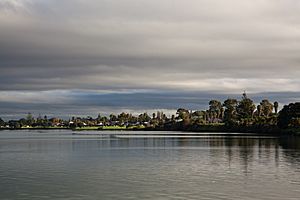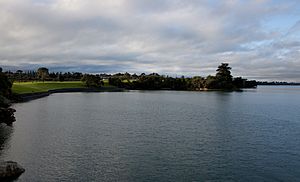Point England facts for kids
Quick facts for kids
Point England
|
|
|---|---|
|
Suburb
|
|

Point England from the Tamaki River
|
|
| Country | New Zealand |
| Local authority | Auckland |
| Electoral ward | Maungakiekie-Tāmaki ward |
| Local board | Maungakiekie-Tāmaki Local Board |
| Board subdivision | Tāmaki |
| Area | |
| • Land | 149 ha (368 acre) |
| Population
(June 2023)
|
|
| • Total | 5,270 |
|
|
||
Point England is a cool suburb located in Auckland, New Zealand. It's a part of the city that's managed by the Auckland Council.
Contents
Who Lives in Point England?
Point England covers about 1.49 km2 (0.58 sq mi) of land. As of June 2023, around 5270 people live here. This means there are about 3537 people for every square kilometer.
In 2018, the population of Point England was 4,923 people. This was a good increase from 2013 and 2006. There were more females than males living in the area.
The average age of people in Point England was 29 years old. Many young people lived there, with over a quarter of the population being under 15 years old.
People from many different backgrounds call Point England home. The main groups include European/Pākehā, Māori, Pacific peoples, and Asian people.
About a third of the people living in Point England were born outside of New Zealand. This shows how diverse the community is.
Many people in Point England are Christian, while others have no religion. Some follow Māori religious beliefs, Hinduism, Islam, or Buddhism.
A Look Back in Time: Point England's History
Around 1780, the Ngāti Pāoa iwi (a Māori tribe) settled along the western side of the Tamaki River. They also lived at Mokoia, which is now Panmure.
Early visitors in the 1820s saw many Ngāti Pāoa settlements and farms. One visitor, John Butler, thought about 4,000 people lived in Mokoia. He saw many villages and a lot of farmed land.
Another visitor, Captain D'Urville, came in 1827. He saw people fishing and looking for shellfish in the area. This showed how active the community was.
Between 1836 and 1839, Ngāti Pāoa and other iwi talked with missionaries about land. They wanted to make sure Māori could still use their land. In 1837, it was agreed that Māori would keep at least a third of the land.
On March 4, 1840, sixteen Ngāti Pāoa rangatira (chiefs) signed the Treaty of Waitangi at Karaka Bay. This was an important agreement for New Zealand.
Later, in 1842, the Crown (the government) took a lot of this land. Ngāti Pāoa did not get their land back or any payment.
In the 1920s and 1930s, people thought about building an airport in Point England. However, this idea was dropped because the land was too expensive.
More recently, on March 20, 2021, the Crown and Ngāti Pāoa signed a Deed of Settlement. The Crown said sorry for taking Ngāti Pāoa's land without paying them. They recognized the iwi's important role in New Zealand's history.
Learning in Point England
Point England has two schools for younger students.
- Point England School
- Ruapotaka School
Both schools teach students from year 1 to year 8. As of February 2024, Point England School has 464 students. Ruapotaka School has 120 students.
Point England's Future
Point England is part of a big plan to make the Tamaki area better. The Tamaki Regeneration Company is in charge of this project. It's owned by the government and the Auckland Council.
The company started in 2014. Its goals are to improve the community, help the economy, and build more homes. This project will happen over 15 to 20 years. The number of people living in the area is expected to double as new homes are built.
 | Delilah Pierce |
 | Gordon Parks |
 | Augusta Savage |
 | Charles Ethan Porter |


